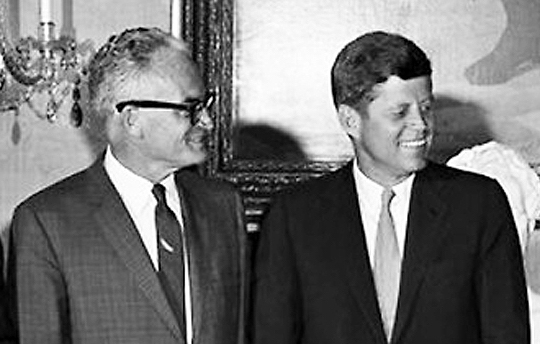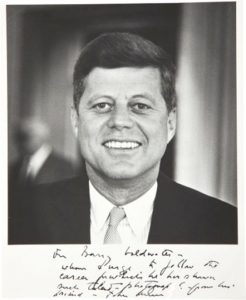
Memories: Goldwater and Kennedy: 20 and 55 Years On
A Goldwater Inscription
22 November 2018— A photographer friend sends along praise of Barry Goldwater (1909-1998). The Senator was noted portrayer of his beloved Southwest: “I am reading an issue of Arizona Highways devoted to his work. The only thing he was more passionate about than politics was his photography. And he was a great cameraman.” Praise of one photographer for another is high recommendation.
His note reminded me of People and Places, Goldwater’s fine book of photographs, from canyons to Hopi. The depth of feeling for Arizona’s native peoples and natural vistas in those photos belies the picture his enemies tried to paint of Goldwater when he ran for President in 1964.

The book’s frontispiece is an impromptu snap of President Kennedy, gone fifty-five years November 22nd. The anniversary went almost unremarked. And after all, for half those now alive, the day so many of us will never forget must seem as ancient as the blue distance of the Middle Ages.
The photo is inscribed: “For Barry Goldwater – Whom I urge to follow the career for which he has shown such talent—photography! From his friend – John Kennedy.” In his preface, Goldwater writes that while they had certain political disagreements, he thought that photo captured the effervescent spirit that he knew.
I have one of these framed. To me it represents the political respect and cordiality of a time long gone. It is unlikely to return in the foreseeable future.
Friends and Colleagues, Regardless…
It was an astonishing relationship. Goldwater was chairman of the Republican Senate Campaign Committee when then-Senator Kennedy began showing interest in running for President. In his travels on behalf of Republicans, Goldwater recalled, he would inevitably learn what voters thought of Kennedy. This he would impart to his friend Jack! “You’re not doing so well in rural Iowa, but things are looking up in Des Moines.”
After Kennedy became President in 1960, they both realized that the next election might pit them against each other. They actually considered campaigning together—against each other—in 1964. It would have been a kind of whistle-stop Lincoln-Douglas debate series.
Then came Dallas, November 1963. We lost the President, Goldwater his friend. He ran anyway, and was smeared. A mad bomber and a philistine, he’d return us to the Stone Age. It was the beginning of the end for the style of politics Goldwater and Kennedy espoused and exemplified.
I cast my first presidential vote for Barry Goldwater, but he was an awful campaigner and by November I could barely bring myself to pull the lever. Maybe I’m naïve, but in retrospect I’ve often thought that neither he nor Jack Kennedy would have stood for 58,000 dead in Vietnam. They would have ended it long before that happened. One way or the other. This is no reflection on those who, according to their lights, wound up with the task of making the decisions.
Without too much argument, we may date 22 November 1963 as the beginning of the end of postwar innocence and absolute faith in our destiny: the grim prelude to Vietnam and Watergate, to the politics of personal destruction. An old friend said to me at a high school reunion: “That’s when the rot began.”
Note
This article was published in The American Spectator.







2 thoughts on “Memories: Goldwater and Kennedy: 20 and 55 Years On”
Reading this article post Election Day 2020. My God, how far we as a nation have fallen. What would Barry Goldwater and JFK have to say in response to the incivility and incompetence of the most recently defeated Commander in Chief?
=
Well said, though I suspect, as the article suggests, incivility and incompetence are examples of the old chicken and egg conundrum. RML
A great article about JFK and Goldwater. I remember where I was when I heard about Dallas. On a Friday evening I was about to enter a dance hall in the Netherlands. The next morning hope disappeared. I remember thinking, I wished they had shot me instead. That illustrates the feeling. I had just finished my army duty and would come to the U,S.A. three months later for the first time. It was an emotional time.
Comments are closed.